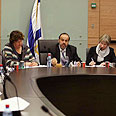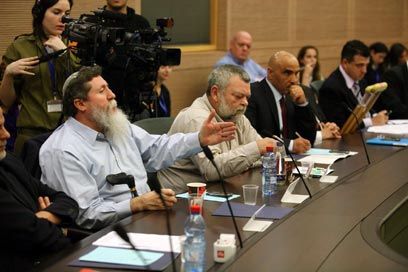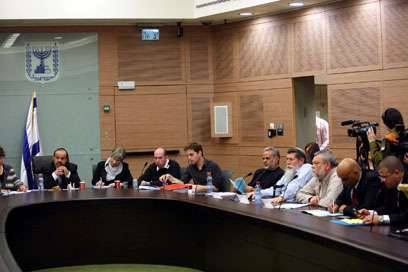
Refugee at Knesset: Holocaust survivors should understand us
Oscar of Congo tells Ynet after Knesset debate on bill to prevent infiltration into Israel, that most refugees he knows had escaped real danger. Reserves soldier says hard to distinguish refugees from infiltrators on Egyptian border
Balas stated that the Egyptian border serves as a route for drug dealers, sex traffickers and migrant workers and therefore some of those who infiltrate through it are considered refugees. "There is no intention of deviating from the convention and prosecuting refugees, we are very careful on this issue," he said and added that volunteers and employees of aid groups will not be affected by the law.

Knesset committee meeting Wednesday morning (Photo: Gil Yohanan)
"One must remember that there are people who are part of smuggling networks and on the border one cannot distinguish between an infiltrator and a refugee."
Arik Rivkin, a reserves soldier who was stationed on the Egyptian border attended the debate and spoke about the reality which soldiers face.
"I am supposed to take in the refugees according to the law, establish whether they have a security background and in addition send them back to Egypt. I consider myself an intelligent person, but I am not properly trained for this and therefore I have no ability of distinguishing between refugees and infiltrators. I simply don't know how to do it," he said.
He criticized the State, which according to him "unfairly asks that we determine people's destinies." Rivkin said he witnessed the brutal way in which Egyptian security forces treat the infiltrators and noted that they beat and shoot them.

Discussing prevention of infiltrators (Photo: Gil Yohanan)
MK Faina Kirshenbaum (Yisrael Beiteinu) said that refugees settling in the weaker cities create a burden for the locals. "I'm certain they will not be welcomed in Raanana or Herzliya," she said and added, "I suggest opening an air route to Belgium or Sweden and we'll see how European countries welcome such an amount of refugees. I suggest they be turned over to other countries."
Refugee with no status
Oscar, a refugee from Congo who arrived in Israel in 1994, also attended the discussion. Since then he has been residing in Israel without an official status, and has not been considered for one. During his stay in the country he met his wife, who is up for deportation. The couple has a six year old daughter.
Oscar told Ynet at the end of the debate that he had arrived in order to try and illustrate to the committee members the refugees' dire situation.
"Most of the refugees I know who live in south Tel Aviv are indeed refugees who escaped danger," he said and added, "We didn't choose to be refugees. There are many children of Holocaust survivors here (in the committee) who were in a similar state as ours, and therefore they should understand us."
Oscar also noted, "My status in Israel is unclear. Among the people I know there are people who escaped real danger and a very small part are migrant workers. We are trying to change reality."










